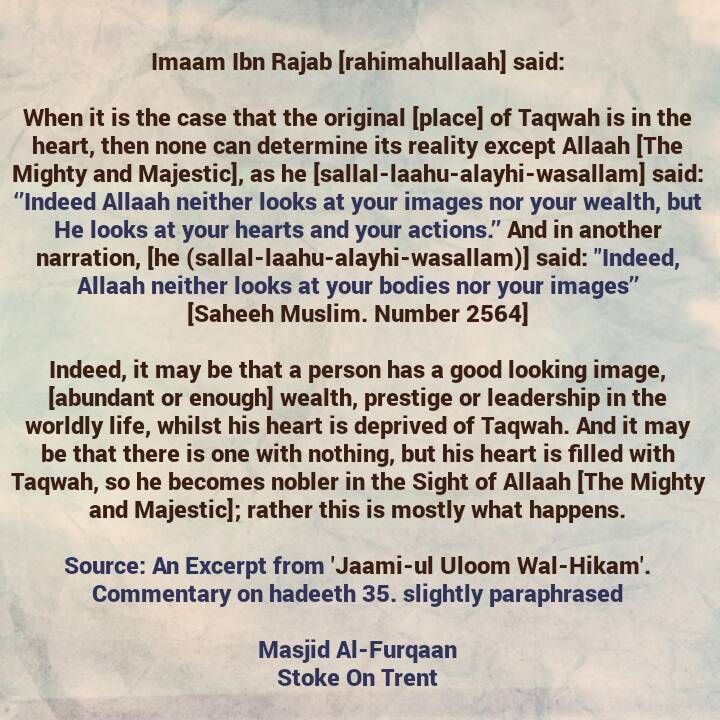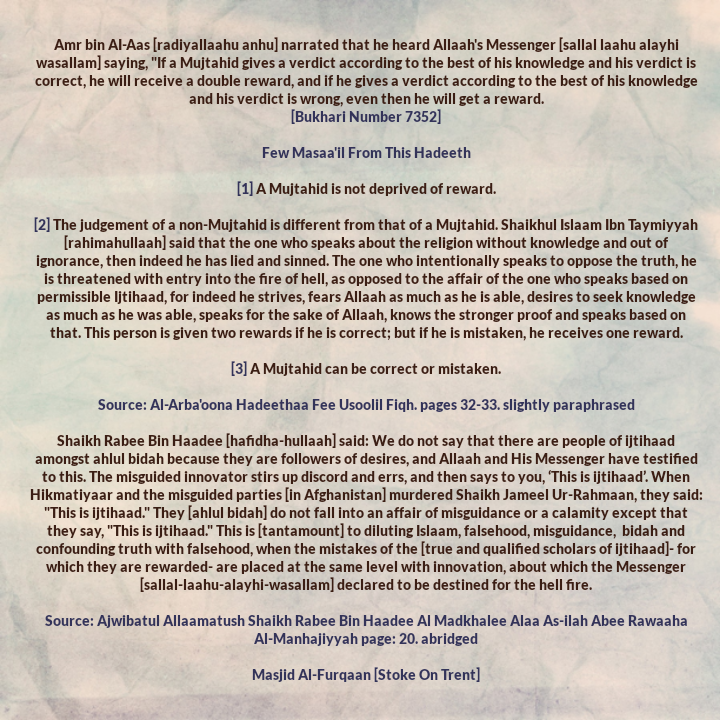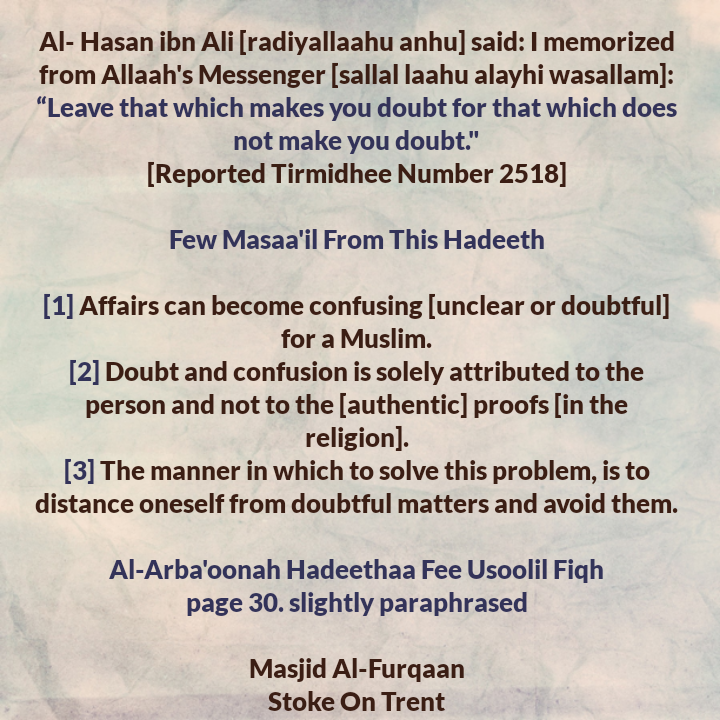In The Name of Allaah, The Most Merciful, The Bestower of Mercy.
Shaikh Abdur Razzaaq al-Badr [may Allaah protect him] says:
Belief In Qadr – Allaah’s Divine Decree
A servant [i.e. a Mulsim] is not afflicted by a calamity except that which Allaah has written and decreed. Allaah said: [قُل لَّن يُصِيبَنَآ إِلَّا مَا ڪَتَبَ ٱللَّهُ لَنَا هُوَ مَوۡلَٮٰنَاۚ وَعَلَى ٱللَّهِ فَلۡيَتَوَڪَّلِ ٱلۡمُؤۡمِنُونَ – Say: “Nothing shall ever happen to us except what Allah has ordained for us. He is our Maula (Lord, Helper and Protector).” And in Allah let the believers put their trust]. [Surah At-tawbah. Aayah 51]
Nothing afflicts the servant except that which Allaah has written for him and this is why the servant is greatly in need – in this particular affair and every other affair – to renew his belief in Allaah’s Divine Will and Decree.
Firm Belief That Only Allaah Can Remove Harm
The believer should know that removal of harm is only in the hand of Allaah. Harm cannot be removed except by Allaah, and none can repel calamity except him. Allaah [The Most High] said: [أَمَّن يُجِيبُ ٱلۡمُضۡطَرَّ إِذَا دَعَاهُ وَيَكۡشِفُ ٱلسُّوٓءَ وَيَجۡعَلُڪُمۡ خُلَفَآءَ ٱلۡأَرۡضِۗ أَءِلَـٰهٌ۬ مَّعَ ٱللَّهِۚ – Is not He (better than your gods) Who responds to the distressed one, when he calls Him, and Who removes the evil, and makes you inheritors of the earth, generations after generations. Is there any true (god) besides Allah? [Surah An-Naml. Aayah 62]
Allaah [The Most High] said: [قُلِ ٱدۡعُواْ ٱلَّذِينَ زَعَمۡتُم مِّن دُونِهِۦ فَلَا يَمۡلِكُونَ كَشۡفَ ٱلضُّرِّ عَنكُمۡ وَلَا تَحۡوِيلاً – Say (O Muhammad): “Call unto those besides Him whom you pretend [to be gods like angels, Iesa (Jesus), ‘Uzair (Ezra), etc.]. They have neither the power to remove the adversity from you nor even to shift it from you to another person.”] [Surah Al-Israa. Aayah 56]
Allaah [The Most High] said: [ قُلۡ أَفَرَءَيۡتُم مَّا تَدۡعُونَ مِن دُونِ ٱللَّهِ إِنۡ أَرَادَنِىَ ٱللَّهُ بِضُرٍّ هَلۡ هُنَّ كَـٰشِفَـٰتُ ضُرِّهِۦۤ أَوۡ أَرَادَنِى بِرَحۡمَةٍ هَلۡ هُنَّ مُمۡسِكَـٰتُ رَحۡمَتِهِ – Say: “Tell me then, the things that you invoke besides Allah, if Allah intended some harm for me, could they remove His harm, or if He (Allah) intended some mercy for me, could they withhold His Mercy?] [Surah Az-Zumar. Aayah 38]
Allaah [The Most High] said: [وَإِن يَمۡسَسۡكَ ٱللَّهُ بِضُرٍّ۬ فَلَا ڪَاشِفَ لَهُ ۥۤ إِلَّا هُوَۖ وَإِن يَمۡسَسۡكَ بِخَيۡرٍ۬ فَهُوَ عَلَىٰ كُلِّ شَىۡءٍ۬ قَدِيرٌ۬ – And if Allah touches you with harm, none can remove it but He, and if He touches you with good, then He is Able to do all things]. [Surah Al-An’aam. Aayah 17]
Allaah [The Most High] said: [وَإِنْ يَمْسَسْكَ اللَّهُ بِضُرٍّ فَلَا كَاشِفَ لَهُ إِلَّا هُوَ وَإِنْ يُرِدْكَ بِخَيْرٍ فَلَا رَادَّ لِفَضْلِهِ يُصِيبُ بِهِ مَنْ يَشَاءُ مِنْ عِبَادِهِ وَهُوَ الْغَفُورُ الرَّحِيمُ – And if Allah touches you with hurt, there is none who can remove it but He; and if He intends any good for you, there is none who can repel His Favour which He causes it to reach whomsoever of His slaves He will. And He is the Oft-Forgiving, Most Merciful]. [Surah Yunus. Aayah 107]
Allaah is the one who will remove harm and calamity, hardship etc
Reliance upon Allaah
Reliance upon Allaah, surrendering one’s affairs to Him- and truthfully turning to Him, because whoever relies on Allaah, Allaah will suffice him. Allaah said: [أَلَيۡسَ ٱللَّهُ بِكَافٍ عَبۡدَهُ – Is not Allah Sufficient for His slave?] [Surah Az-Zumar. Aayah 36]
Allaah said [The Most High] said: [وَمَن يَتَوَكَّلۡ عَلَى ٱللَّهِ فَهُوَ حَسۡبُهُ ۥۤۚ إِنَّ ٱللَّهَ بَـٰلِغُ أَمۡرِهِۦۚ قَدۡ جَعَلَ ٱللَّهُ لِكُلِّ شَىۡءٍ۬ قَدۡرً۬ا – And whosoever puts his trust in Allah, then He will suffice him. Verily, Allah will accomplish his purpose. Indeed Allah has set a measure for all things]. [Surah At-talaaq. Aayah 3]
Allaah appointed a term for everything- a specific time; therefore, O you who relies upon Allaah! Neither be slow to act nor be hasty [i.e. rely upon Allaah now, hope for relief and do not be frustrated due to being hasty].
Supplication
Supplication is the key to every good, relief from every distress, safety from every fear, the weapon of the believer and benefits in repelling calamity- a mighty benefit; rather supplication is the enemy of calamity. It is obligated on the servant to seek shelter [or shield himself] through supplication, have great hope and continuously asking [Allaah]. Allaah [The Most High] said: [وَقَالَ رَبُّڪُمُ ٱدۡعُونِىٓ أَسۡتَجِبۡ لَكُمۡۚ إِنَّ ٱلَّذِينَ يَسۡتَكۡبِرُونَ عَنۡ عِبَادَتِى سَيَدۡخُلُونَ جَهَنَّمَ دَاخِرِينَ – And your Lord said: “Invoke Me, [i.e. believe in My Oneness (Islamic Monotheism)] (and ask Me for anything) I will respond to your (invocation). Verily! Those who scorn My worship [i.e. do not invoke Me, and do not believe in My Oneness, (Islamic Monotheism)] they will surely enter Hell in humiliation!”] [Surah Ghaafir. Aayah 60]
Allaah [The Most High] said: [ وَإِذَا سَأَلَكَ عِبَادِى عَنِّى فَإِنِّى قَرِيبٌۖ أُجِيبُ دَعۡوَةَ ٱلدَّاعِ إِذَا دَعَانِۖ فَلۡيَسۡتَجِيبُواْ لِى وَلۡيُؤۡمِنُواْ بِى لَعَلَّهُمۡ يَرۡشُدُونَ – And when My slaves ask you (O Muhammad) concerning Me, then (answer them), I am indeed near (to them by My Knowledge). I respond to the invocations of the supplicant when he calls on Me (without any mediator or intercessor). So let them obey Me and believe in Me, so that they may be led aright]. [Surah Al-Baqarah. Aayah 186]
Allaah [The Most High] said:
ٱدۡعُواْ رَبَّكُمۡ تَضَرُّعً۬ا وَخُفۡيَةًۚ إِنَّهُ ۥ لَا يُحِبُّ ٱلۡمُعۡتَدِينَ
وَلَا تُفۡسِدُواْ فِى ٱلۡأَرۡضِ بَعۡدَ إِصۡلَـٰحِهَا وَٱدۡعُوهُ خَوۡفً۬ا وَطَمَعًاۚ إِنَّ رَحۡمَتَ ٱللَّهِ قَرِيبٌ۬ مِّنَ ٱلۡمُحۡسِنِينَ
Invoke your Lord with humility and in secret. He likes not the aggressors. And do not do mischief on the earth, after it has been set in order, and invoke Him with fear and hope; Surely, Allah’s Mercy is (ever) near unto the good doers. [Surah Al-A’raaf. Aayaat 55-56]
The Prophet [sallal laahu alayhi wasallam] said, “Supplicate to Allaah whilst having certainty that you’ll be responded to”. The Prophet [sallal laahu alayhi wasallam] said: “Supplication benefits in that which has occurred and in that which has not occurred, so upon you is to supplicate”- Meaning: Supplication removes it [i.e. when the calamity occurs] and repels it [i.e. if it has not occurred yet].
And one of those beneficial supplication in this subject matter is that which has been reported in Abu Dawud from Anas [radiyallaahu-anhu] who said that the Prophet [sallal laahu alayhi wasallam] used to supplicate saying: [ اللَّهمَّ إِنِّي أَعُوُذُ بِكَ مِنَ الْبرَصِ، وَالجُنُونِ، والجُذَامِ، وسّيءِ الأَسْقامِ – O Allah! I seek refuge in You from leucoderma , insanity, leprosy and evil diseases]
The Worldly Life Is a Place of Trial and Test
To know with certainty – in this subject matter of ours- that this Dunyaa is a place of trial and test. Allaah [The Most High] said:[ ٱلَّذِى خَلَقَ ٱلۡمَوۡتَ وَٱلۡحَيَوٰةَ لِيَبۡلُوَكُمۡ أَيُّكُمۡ أَحۡسَنُ عَمَلاً۬ۚ وَهُوَ ٱلۡعَزِيزُ ٱلۡغَفُورُ – He is the One] Who has created death and life, that He may test you which of you is best in deed. And He is the All-Mighty, the Oft-Forgiving [Surah Al-Mulk. Aayah 2]
Allaah [The Most High] said: [وَهُوَ ٱلَّذِى جَعَلَڪُمۡ خَلَـٰٓٮِٕفَ ٱلۡأَرۡضِ وَرَفَعَ بَعۡضَكُمۡ فَوۡقَ بَعۡضٍ۬ دَرَجَـٰتٍ۬ لِّيَبۡلُوَكُمۡ فِى مَآ ءَاتَٮٰكُمۡۗ إِنَّ رَبَّكَ سَرِيعُ ٱلۡعِقَابِ وَإِنَّهُ ۥ لَغَفُورٌ۬ رَّحِيمُۢ – And it is He Who has made you generations coming after generations, replacing each other on the earth. And He has raised you in ranks, some above others that He may try you in that which He has bestowed on you. Surely your Lord is Swift in retribution, and certainly He is Oft-Forgiving, Most Merciful]. [Surah Al-An’aam. Aayah 165]
Allaah [The Most High] said: [وَهُوَ ٱلَّذِى خَلَقَ ٱلسَّمَـٰوَٲتِ وَٱلۡأَرۡضَ فِى سِتَّةِ أَيَّامٍ۬ وَڪَانَ عَرۡشُهُ ۥ عَلَى ٱلۡمَآءِ لِيَبۡلُوَڪُمۡ أَيُّكُمۡ أَحۡسَنُ عَمَلاً۬ۗ – And He it is Who has created the heavens and the earth in six Days and His Throne was on the water, that He might try you, which of you is the best in deeds]. [Surah Hud. Aayah 7]
Allaah [The Most High] said:
وَنَبۡلُوكُم بِٱلشَّرِّ وَٱلۡخَيۡرِ فِتۡنَةً۬ۖ وَإِلَيۡنَا تُرۡجَعُونَ
And We shall make a trial of you with evil and with good, and to Us you will be returned. [Surah Al-Anbiyaa. Aayah 35]
Therefore, it is obligated on us to know that the pleasures of this world are mixed with pain; its happiness is mixed with distress; its good health is mixed with sickness, and its richness is mixed with poverty. The slave will be afflicted- and that is inevitable in this worldly life; but his affair and its final outcomes is good and uplifting [or a means of raising his status], as the Prophet [sallal laahu alayhi wasallam] said, “Amazing is the affair of the believer, verily all of his affair is good and this is not for no one except the believer. If something of good/happiness befalls him he is grateful and that is good for him. If something of harm befalls him he is patient and that is good for him” [Saheeh Muslim 2999]
I ask Allaah by His Beautiful [Perfect] Names and Lofty [Perfect] Attributes – and due to the fact that none has the right to be worshipped except He- to remove from us and the Muslims – wherever they maybe – every harm and calamity, remove from us the severe hardship and protect us all through that which He protects his righteous servants. [Ref 1]
The Shaikh also says:
All praise and thanks belongs to Allaah- the One Who responds to the supplication of the distressed one when he supplicates; gives help to the sorrowful one when he invokes Him; removes evil and grants a way out from agonies. The hearts cannot be alive [i.e. with Eemaan, guidance etc] except by way of remembering Him; no affair occurs except by His Permission; there is no escape from discomfort except by way of His Mercy; nothing can be protected [or preserved] except by His Protection. What is desired cannot be obtained except by His facilitation, and happiness [in this Dunya and the Aakhirah] cannot be attained except by way of obedience to Him. I bear witness that none has the right to be worshipped except Allaah alone and He has no partner- the Lord of the Aalameen, the [only true] God of the early and latter generations; the One Who maintains and controls the heavens and the earths. And I bear witness that Muhammad is His slave and Messenger – the one sent with the clear book [i.e. the Qur’aan] and the straight path. May peace and blessings of Allaah be upon him, his family and all his companions.
[A] What is to be said before a trial occurs:
Uthmaan [radiyallaahu-anhu] said: I heard Allaah’s Messenger [sallal laaju alayhi wasallam] saying: Whoever says:
بِسْمِ اللَّهِ الذي لا يَـضُرُّ مع اسْمِهِ شَيءٌ في الأرضِ ولا في السَّماءِ وهُوَ السَّميعُ العَليمُ
In the Name of Allaah, with Whose Name nothing can be harmed- neither on earth nor in the heaven, and He is the All-Seeing, the All-Hearing”- 3 times. He will not be afflicted with affliction [or a trial] until the morning. And whoever says it three times when he wakes up, he will not be inflicted with an affliction [or trial] until the evening. [Reported by Imaam Abu Daawud and others] [Ref 2]
[بِسْمِ اللَّهِ]- Meaning: In the Name of Allaah I seek refuge. [الذي لا يَـضُرُّ مع اسْمِهِ شَيءٌ في الأرضِ – with Whose Name nothing can be harmed- neither on earth nor in the heaven]- Meaning: The one who seeks refuge in Allaah’s Name, then indeed he will not be harmed by a calamity that occurs in the earth nor that which comes from the heaven. [وهُوَ السَّميعُ العَليمُ – and He is the All-Seeing the All-Hearing]- Meaning: He [Allaah] hears all the statements of His slaves, The One who knows all their actions and nothing is hidden from Him on the earth nor in the heaven. [Ref 3]
[B] Repeating – a lot – the statement:
[لَا إِلَهَ إِلَّا أَنْتَ سُبْحَانَكَ إِنِّي كُنْتُ مِنَ الظَّالِمِينَ – None has the right to be worshipped except You (O Allaah); Glorified (and Exalted) are You (above all that evil) they associate with You]. Truly, I have been of the wrong doers].
Allaah [The Mighty and Majestic] said:
وَذَا النُّونِ إِذْ ذَهَبَ مُغَاضِبًا فَظَنَّ أَنْ لَنْ نَقْدِرَ عَلَيْهِ فَنَادَى فِي الظُّلُمَاتِ أَنْ لَا إِلَهَ إِلَّا أَنْتَ سُبْحَانَكَ إِنِّي كُنْتُ مِنَ الظَّالِمِينَ
فَاسْتَجَبْنَا لَهُ وَنَجَّيْنَاهُ مِنَ الْغَمِّ وَكَذَلِكَ نُنْجِي الْمُؤْمِنِينَ
And (remember) Dhan-Nun (Jonah), when he went off in anger, and imagined that We shall not punish him (i.e. the calamites which had befallen him)! But he cried through the darkness (saying): La ilaha illa Anta [none has the right to be worshipped but You (O Allah)], Glorified (and Exalted) are You [above all that (evil) they associate with You]. Truly, I have been of the wrong-doers.” So We answered his call, and delivered him from the distress. And thus We do deliver the believers (who believe in the Oneness of Allah, abstain from evil and work righteousness). [Surah Al-Anbiyaa. Aayaat 87-88]
Al-Haafidh Ibn Katheer [rahimahullaah] stated in his Tafseer regarding statement of [Allaah- The Exalted]: [كَذَلِكَ نُنْجِي الْمُؤْمِنِينَ – And thus do We deliver the believers]- Meaning: If they are in hardships and invoke Us, and (always) turning in repentance to Us (only), especially if they supplicate with this invocation when in a state of affliction [or trial].
Al-Allaamah Ibnul Qayyim [rahimahullaah][ stated in Al-Fawaa’id: There is nothing similar to the likes of Tawheed in repels hardships of the worldly life; so due to this, the invocation of distress is [based] on Tawheed. The one in a state of distress does not invoke [Allaah] with the invocation of Dhun-Noon, except that Allah will grant him relief from his distress due to Tawheed. Therefore, one does not fall into great distress except because of Shirk, and there is no safety from it except through Tawheed. It [i.e. Tawheed] is the sanctuary of the creation, its refuge, its fortress and means of relief. And the means of all success [i.e. in this Dunyaa and Aakhirah] is facilitated by Allaah. [Ref 4]
Sa’d Bin Abee Waqqaas [radiyallaahu-anhu] narrated that the Prophet [sallal-laahu-alayhi-wasallam] said: “The invocation of my brother Dhun-Noon:[لا إِلَهَ إِلا أَنتَ سُبْحَانَكَ إِنِّي كُنتُ مِنَ الظَّالِمِينَ – none has the right to be worshipped but You (O Allah), Glorified (and Exalted) are You (above all that evil) they associate with You. Truly, I have been of the wrong doers]; there is no one who faces hardship and supplicates with it, except that Allaah will relief him of his hardship”. [Saheeh Al-Jaami 3383]
Look at the great distress that befell Yoonus [alayhis-salaam]?! The whale swallowed him and went to the bottom of the sea. He was in the belly of the whale and at the bottom of the sea – a great distress indeed. Therefore, there was nothing else for him to do at the time except to keep on repeating that supplication, whilst he was engulfed in darkness – the darkness in the whale’s belly, the darkness in the sea and the darkness of the night, and trapped at the bottom of the sea. He repeated this supplication, so Allaah commanded the whale to take him out. Yoonus [alayhis-salaamn] made this supplication whilst having a strong reliance upon Allaah and knew that deliverance from such a distress is in Allaah’s hand.
This supplication comprises of four affairs:
-[Tawheed: (لا إِلَهَ إِلا أَنتَ)-None has the right to be worshipped except You (O Allaah)]. This is singling out Allaah in worship. -[ سُبْحَانَكَ – Glorified (and Exalted) are You (above all that evil) they associate with You]; Meaning: I declare that You (O Allaah) are free from everything that does not befit Your Majesty. I declare that You (O Allaah) are free from all deficiencies and defects, and I declare that You (O Allaah) are free from all that which the enemies of the Messengers attribute to You. Allaah [The Most High] said: [سُبۡحَـٰنَ رَبِّكَ رَبِّ ٱلۡعِزَّةِ عَمَّا يَصِفُونَ – Glorified be your Lord, the Lord of Honour and Power! (He is free) from what they attribute unto Him! (37:180)]
-[إِنِّي كُنتُ مِنَ الظَّالِمِينَ – Truly, I have been of the wrong-doers]. This is an acknowledgement of one’s wrongdoing and shortcomings. -[Servitude to Allaah]: An acknowledgement that you are a slave of Allaah and that you cannot do without Allaah in the twinkling of an eye. Therefore, a person should turn to Allaah in all circumstances – when faced with pain, hardship, calamity etc. [Ref 5]
[C] Seeking Refuge With Allaah Against The Severe Afflictions [Trials or Calamities]:
عن أبِي هُرَيرَةَ رضي الله عنه
كان رَسُولُ اللَّهِ صلى الله عليه وسلم يَـتَـعَـوَّذُ مِنْ جَهْدِ البلاءِ، ودَرَكِ الشَّقاءِ، وَسُوءِ القضاءِ، وشَماتَةِ الأَعدَاءِ
وعن أبي هُرَيرَةَ رضي الله عنه، عن النَّبِيِّ صلى الله عليه وسلم قَالَ
تَعَوَّذُوا بِاللَّهِ مِنْ جَهْدِ الـبَـلاءِ، ودَرَكِ الشَّقَاءِ، وَسُوءِ القَضَاءِ، وشَماتَـةِ الأعداءِ
Abu Hurairah [radiyallaahu-anhu] said: “Allaah’s Messenger [sallal laahu alayhi wasallam] used to seek refuge against the severe afflictions [trials or calamities], a state of wretchedness, the evil of that which has been decreed and the rejoicing of the enemies”. Abu Hurairah [radiyallaahu-anhu] said that Allaah’s Messenger [sallal laahu alayhi wasallam] said, “Seek refuge with Allaah against the severe afflictions [trials or calamities], a state of wretchedness, the evil of that which has been decreed and the rejoicing of the enemies”. [Ref 6]
Imaam Abdul Azeez bin Baaz [may Allaah have mercy on him] said that this means: So that one is not put to trial with something that harms him; fall into state of wretchedness – in sin and Shirk; and we ask Allaah for wellbeing. A person should strive to take the means to safety and seek Allaah’s Protection against the severe afflictions [or trials]; a state that is tantamount to wretchedness, the rejoicing of the enemies and the evil of that which is decreed. This what a believer should strive for and asks his Lord for wellbeing, for indeed the enemies rejoice when he falls into that which harms him, but he strives to attain wellbeing and [seeks protection] against the severe affliction [trials], or that which will bring about evil upon him – those afflictions and trials that descend on the people. He seeks refuge against wretchedness lest something happens to him that leaves him in a wretched state and makes him fall into sin, evil affairs or fall in Major Shirk. We ask Allaah for wellbeing. He seeks refuge against the evil of that which is decreed lest he falls into sin and is put to trial through that which Allaah has forbidden. He seeks refuge against the rejoicing of the enemies, which is similar to what has preceded above lest he falls into something that makes the enemies rejoice…[Ref 7]
[D] Being Consistent Upon The Supplication That Is Said When Leaving The House:
Anas Bin Maalik [radiyallaahu-anhu] said that the Prophet [sallal laahu alayhi wasallam] said: If a man exits his house and says:
بِسْمِ اللهِ ، تَوَكَّلْتُ عَلَى اللهِ وَلَا حَوْلَ وَلَا قُوَّةَ إِلَّا بِاللهِ
“In The Name of Allaah, I rely on Allaah, and there is neither Power nor Might except with Allaah”. It will be said there and then, ‘You have been guided, sufficed and protected’. The devils will be far away from him [or get out of his way] and another devil will say, ‘ How can you reach a man who has been guided, sufficed and protected’”. [Ref 8]
Shaikhul Islaam Ibn Taymiyyah [rahimahullaah] said that this means, “No power or strength is given to anything or anyone [in the entire universe] to move from one action to another, except by strength and power granted by Allaah alone. [Ref 9]
[E] Asking Allaah For Wellbeing In The Morning and Evening
Abdullah Bin Umar [radiyallaahu-anhumaa] said: Allaah’s Messenger [sallal laahu alayhi wasallam] never abandoned these supplications in the morning and evening:
اللَّهُمَّ إِنِّي أَسْأَلُكَ العافِيَـةَ فـي الدُّنيا والآخِرَةِ، اللَّهُمَّ إِنِّي أَسْأَلُكَ العَفْوَ والعافِيَـةَ فـي دِيني ودُنْـيايَ وأَهْلِي ومالِي، اللَّهُمَّ اسْتُـرْ عَوْراتِي، وآمِنْ رَوْعاتِي، اللَّهُمَّ احْفَظْنِـي مِنْ بَـيْنِ يَدَيَّ، ومِنْ خَلْفِي، وعَنْ يَمِيـنِـي، وعَنْ شِمالِي، ومِنْ فَوْقِي، وأَعُوذُ بِعَظَمَـتِكَ أَنْ أُغْتالَ مِنْ تَحْتِـي
“O Allaah! I ask You for well-being in this Dunyaa and the Aaakhirah. O Allāh, I ask You for pardon and well-being in my religion, my worldly affairs, my family and my wealth. O Allaah! Conceal my [faults, shortcomings etc] and safeguard me against everything that will bring me fear and sorrow. O Allaah! Protect me from in front, from behind me, from my right and my left, and from above. And I seek refuge with Your Magnificence from being swallowed up from beneath me”. [Ref 10]
This great supplication begins with one asking Allaah for [العافِيَـةَ -wellbeing] in the Dunyaa and Aakhirah. Nothing can be equal to wellbeing, and whoever is granted wellbeing then indeed he has received his complete share of good. Seeking [العَفْوَ -person] necessitates that one is forgiven his sins and they are wiped away. As for [العافِيَـةَ – Wellbeing], it is safety Allaah bestows to a servant of His- protects him against every punishment and trial, by averting evil from him, protecting him against calamities and ailments [sicknesses], evil affairs and sins.
So, the Messenger [sallal laahu alayhi wasallam] asked for wellbeing in the Dunyaa and Aakhirah, as well as wellbeing in his religion, worldly affairs, his family and wealth. Wellbeing in one’s religion is protection against everything that will bring dishonour [or disgrace] to one’s religion or deprive him of it. Wellbeing in the Dunyaa is to seek protection against everything that will harm the person in his worldly affairs, such as calamities or trials, severe poverty and ailments. Wellbeing in the Aakhirah is to seek protection against the extreme hardships in the Aakhirah and its various punishments. Wellbeing in one’s family is that they are protected from trials, calamities and tests; wellbeing in one’s wealth is that it is protected from drowning, burning, theft etc…
[اللَّهُمَّ اسْتُـرْ عَوْراتِي – O Allaah! Conceal my faults, shortcomings etc [ وآمِنْ رَوْعاتِي – safeguard me against every affair that will frighten me and bring sorrow upon me]. [اللَّهُمَّ احْفَظْنِـي مِنْ بَـيْنِ يَدَيَّ، ومِنْ خَلْفِي، وعَنْ يَمِيـنِـي، وعَنْ شِمالِي، ومِنْ فَوْقِي، وأَعُوذُ بِعَظَمَـتِكَ أَنْ أُغْتالَ مِنْ تَحْتِـي – O Allaah! Protect me from in front, from behind me, from my right and my left, and from above. And I seek refuge with Your Magnificence from being swallowed up from beneath me] – Meaning: Asking Allaah to protect you against destructive things and evils which a person is exposed to from the six directions, for indeed evil can approach from the front, behind, the right, the left, above or below, and he does not know which direction calamity will suddenly come upon him….[Ref 11]
[F] To Supplicate a Lot:
Ibn Umar [radiyallaahu-anhumaa] said, “Allaah’s Messenger [sallal laahu alayhi wasallam] said: “Whoever has the door of supplication opened for him, then the door of mercy has been opened for him. And Allaah is not asked for anything – meaning, something more beloved to Him – than asking for well-being”. And Allaah’s Messenger [sallal laahu alayhi wasallam] said: “Indeed, supplication brings benefit to the afflicted person and the one who has not been afflicted; therefore O slaves of Allaah! It is obligated on you to supplicate”. [Ref 12]
[G] Subject Matter Regarding Physical Contract And Infectious Disease
Abdullaah Bin Aamir [radiyallaahu-anhu] said, “Umar [radiyallaahu-anhu] travelled to Syria; so when reached Sargh, it reached him that the pestilence has reached Shaam. So Abdur Rahmaan bin Awf [radiyalllaahu-anhu] informed him that Allaah’s Messenger [sallal laahu-alayhi wasallam] said: ‘If you hear that it [i.e. the pestilence] is in particular land [or country], then do not go there; and if it occurs in a land where you are in, then do exit it – fleeing from it’”. Abu Hurairah [radiyallaahu-anhu] said that Allaah’s Messenger [sallal laahu alahi wasallam] said, “Do not mix [or expose] the sick person to the healthy”. [Ref 13] [Must Refer to the following links for clarification by Shaikh Abu Iyaad’s (hafidhahullaah) regarding diseases and infections, the Difference Between the Plague (al-Ṭaʿūn) and Common Death / Disease (al-Wabāʾ):https://safeshare.tv/x/ss5e621b8d3e3c4# http://abuiyaad.s3.amazonaws.com/islam/plague-and-disease.pdf https://twitter.com/AbuIyaadSP/status/1249740047512997891 https://drive.google.com/file/d/1LEWIPk_NtpRSxy5fkkF0XdFDQXZbGLZ3/view
[H] Do Good Deeds and Be Good to Others
Anas [radiyallaahu-anhu] said, “Allaah’s Messenger [sallal laahu alayhi wasallam] said: ‘Being good to the people protects a person from evil, ills, destructive affairs; and the people of good in this Dunyaa are the people of good in the Aakhirah’”.
Ibnul Qayyim [rahimahullaah] said: One of the greatest ways of seeking cure for illness are: Doing good deeds and being good to others, remembrance of Allaah, supplicating, humility [accompanied with firm belief], invoking Allaah fervently and repentance. These deeds have an effect on repelling ailments and receiving cure, even greater [or more effective] than natural medication; however this depends on the readiness of the soul is, its acceptance [and submission upon such a path], its belief in that and its benefit. [Ref 14]
[I] The Night Prayer [or At-Tahajjud]
Bilaal [radiyallaagu-anhu] said that Allaah’s Messenger [sallal laahu alayhi wasallam] said, “It is upon you to perform the night prayer, for indeed it is the [continuous] practice of the righteous who came before you. Indeed, the night prayer is a means of getting close to Allaah; a means of preventing one from evil deeds, a means of expiating evil deeds and it is a means of expelling sickness from the body”. [Reported by Imaam at-Tirmidhi and others] [Ref 15]
NB: translator’s note: Imaam Albaani [rahimahullaah] transmitted this hadeeth in Irwaa Al-Ghaleel as follows: “It is upon you to perform the night prayer, for indeed it is the [continuous] practice of the righteous who came before you. It is a means of getting close to your Lord; a means of preventing one from evil deeds and a means of expiating evil deeds”. Then Imaam [i.e. Albaani (rahimahullaah)] declared this Hadeeth ‘Hasan’ without the addition “And it is a means of expelling sickness from the body”. [For further details, see Irwaa Al-Ghaleel. Publisher Al-Maktabah Al-Islaamiy- 2nd edition 1405AH (1985). Vol 2, Pages 199-202. Hadeeth number 452]
[J] Cover The Vessels and Tie Up the Water Skins:
Jaabir Bin Abdillaah [radiyallaahu-anhu] said, “I heard Allaah’s Messenger [sallal laahu alayhi wasallam] saying, “Cover the vessels and tie up the water skins; for verily there is a night during the year when pestilence descends, and it does not pass an uncovered vessel or an untied water-skin but some of that pestilence descends into it. [Reported by Imaam Muslim] Ibnul Qayyim [rahimahullaah] said: This is one of those affairs which the sciences of doctors and their knowledge cannot reach [i.e. it cannot explain, discover].
To conclude, indeed it is obligated on every Muslim to surrender all his affairs to Allaah [The Mighty and Majestic] – hoping for His bounty, desiring to receive it and placing his trust and reliance upon Him, because all affairs are in His Hands, under his absolute disposal and subjugation. And that one strives in fulfilling the affair through which a way out of calamities is achieved – patience and hoping for Allaah’s reward; for indeed Allaah has promised to give an abundant reward to the one who exercises patience and hopes for His Reward. [إِنَّمَا يُوَفَّى ٱلصَّـٰبِرُونَ أَجۡرَهُم بِغَيۡرِ حِسَابٍ۬ – Only those who are patient shall receive their rewards in full, without reckoning].
Finally: What You Can And Can’t Do During Lock down According to the law of the land
https://www.gov.uk/government/publications/coronavirus-outbreak-faqs-what-you-can-and-cant-do/coronavirus-outbreak-faqs-what-you-can-and-cant-do
[Ref 1]: An Excerpt from this link: https://al-badr.net/detail/AbCXLPxgHWcm slightly paraphrased]
Ref 2 : https://al-badr.net/detail/Ox1b6tLIBZ7c
Ref 3: Fiqhul Ad’iyah Wal-Ad’kaar. Vol 3. Pages 13-14
Ref 4: https://al-badr.net/detail/Ox1b6tLIBZ7c
Ref 5: An Excerpt from Atharul Adkaar Ash-Shar’iyyah Fee Tardil Hammi Wal-Gham’ pages 21- 23’ by Shaikh Abdur-Razzaaq Al-Badr (may Allaah preserve him). Slightly Paraphrased
[Ref 6: https://al-badr.net/detail/Ox1b6tLIBZ7c
[Ref:https://binbaz.org.sa/fatwas/11586/%D9%85%D8%B9%D9%86%D9%89-%D8%AD%D8%AF%D9%8A%D8%AB-%D8%A7%D8%B3%D8%AA%D8%B9%D9%8A%D8%B0%D9%88%D8%A7-%D8%A8%D8%A7%D9%84%D9%84%D9%87-%D9%85%D9%86-%D8%AC%D9%87%D8%AF-%D8%A7%D9%84%D8%A8%D9%84%D8%A7%D8%A1
[Ref 8: https://al-badr.net/detail/Ox1b6tLIBZ7c
[Ref 9: Majmoo al-Fataawaa 5/574-575]
[Ref 10: https://al-badr.net/detail/Ox1b6tLIBZ7c
[Ref 11: An Excerpt from Fiqh Al-Ad’iyah Wal Afkaar 3/32-33. Slightly paraphrased]
[Ref 12: https://al-badr.net/detail/Ox1b6tLIBZ7c
[Ref 13: https://al-badr.net/detail/Ox1b6tLIBZ7c
[Ref 14: https://al-badr.net/detail/Ox1b6tLIBZ7c
[Ref 15: https://al-badr.net/detail/Ox1b6tLIBZ7c







